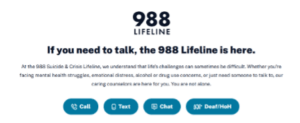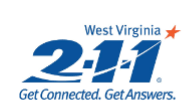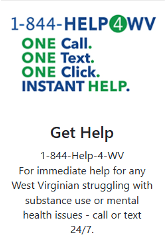ABOUT US
The Center for Student Support Services at WVU Parkersburg offers mental health counseling and disability/accessibility services for students. Our mission at the Center for Student Support Services is to ensure that every student has an equal chance for success in their chosen academic path. For more information on these services, crisis resources, and other links, please select a tab.
The mission of the Counselor is to provide crisis intervention and scheduled brief supportive/problem-solving counseling services to address emotionally distressed issues that are significantly interfering with a student’s ability to function. The Counselor also provides educational services in the form of workshops, seminars, lectures, and mini-presentations on topics related to mental well-being.
Resources
- Crisis Intervention
- Short-term Individual Counseling
- Short-term Couples Counseling
- Mental Health Referral Information
- Mental Health Information
- Problem Solving Sessions
Counseling
- Alcohol & Drug Abuse Concerns
- Anxiety and/or Depression
- Self-confidence concerns
- Stress Management
- Coping with loss
- Relationship concerns
CRISIS TEXT LINE – Text “Hello” to 741741 for 24/7 Chat
Westbrook Health Services Crisis Hotline 1-304-485-1725 or 1-800-579-5844
(for Wood, Wirt, Pleasants, Tyler, Ritchie, Jackson, Roane, Calhoun)
Disability Services
The Office of Disability Services is committed to helping qualified students with disabilities achieve their academic goals by providing reasonable academic accommodations under appropriate circumstances. Appropriate accommodations are based upon both documentation of a disability and the significant functional limitations supported by diagnostic test data. Disability/Accessibility services are provided free of charge.
The following information is designed to help you to understand the policies and procedures related to obtaining disability-related accommodations at WVU Parkersburg. This information is meant to assist you in obtaining services that are available to all students at WVU Parkersburg.
All current, incoming, or transfer students, in person, must:
- Schedule an initial interview with a counselor to register with the Center for Student Support Services (Room 2208) – (304) 424-8378
- Provide documentation of your disability that meets WVU Parkersburg criteria for obtaining disability-related academic accommodations
- Request services on a semester-by-semester basis

The Office of Disability Services at West Virginia University Parkersburg offers an array of assistive technology (AT) and services for student use or accommodation need.
The Center for Student Support Services is open 8:00 a.m. to 4:00 p.m., Monday through Friday, in Room 2208, except for official college holidays and closings, as well as other specified times throughout the year.
Assistive technologies available for use through the Office of Disability Services include:
Kurzweil (available in the Epi Center)
Kurzweil provides both audible and visual accessibility to word documents and web pages. The company is recognized as the leading developer of reading technology for people with learning difficulties and those who are blind or visually impaired.
ZoomText, the world’s leading low-vision solution, is available as a screen magnifier or integrated magnifier/reader. With magnification up to 16x, ZoomText enlarges and enhances everything on the screen, making all your applications easy to see and use.
FM Systems
FM systems work like small radio transmitters and receivers. A parent or teacher wears the FM transmitter and microphone. The receiver picks up the signal from the microphone and routes it to a personal hearing aid, cochlear implant processor, or other device.
UBI Duo is an electronic communication device used by individuals with hearing impairments to enable instant communication.
Sorenson Video Relay Service (SVRS)
SVRS is a free, 24-hour service that enables users to place and receive calls through a professional American Sign Language interpreter via a videophone and high-speed internet connection. The service is available in the Library Room. Access after normal business hours is accomplished with the assistance of Campus Security.
Enlarge Keyboards
Scanners
Text in Alternative Formats
Moving from High School to College
Students having received disability-related accommodations in secondary schools will find important differences as they continue in higher education. Being aware of these differences can make the transition easier. Among the differences are:
- Once a student reaches the age of 18, they will need to give written consent to the Office of Disability Services for any kind of parental involvement. Even if parents are assuming the financial responsibility for a student’s education, this release is still necessary.
- Secondary schools may have provided for the financial cost of securing necessary documentation of a disability. In higher education, that cost is the responsibility of the student.
- The length of time documentation is valid is substantially different in higher education.
- Some types of accommodations, such as study guides, that are often used in secondary education are not available at the college or university level.
- The amount and type of documentation that will be needed may be different between secondary and higher education. More detailed information about differences may be found at: http://www.ed.gov/about/offices/list/ocr/transition.html
Access to a lactation lounge is available for those who need it. Complete the form below to schedule your access.
WV Division of Rehabilitation Services – supports youth and adults with disabilities (age 14 and up) on their path to work and live independently.
Main Page: https://wvdrs.org/
Adult Services: https://wvdrs.org/adults/services/
Regional Transition Navigator Services – provide information, training and resources/services to at-risk youth and young adults statewide.
Main Page: https://rtn.cedwvu.org/
Other Services: https://cedwvu.org/services/
Help & Hope WV – a statewide program in West Virginia that provides information and resources for mental health and substance use issues, as well as prevention programs and job training opportunities.
Main Page: https://helpandhopewv.org/
Stigma Free WV: https://stigmafreewv.org/
WV Bureau for Social Services – this link allows residents to search resources by topic related to safety, permanency, and well-being of children and vulnerable adults, supporting individual to succeed and strengthening families.
Main Page: https://dhhr.wv.gov/bss/Pages/default.aspx
Services: https://dhhr.wv.gov/bss/services/Pages/Community-Resources.aspx
WVDHHR – Bureau for Behavioral Health – Intellectual and Developmental Disabilities
Main Page: https://dhhr.wv.gov/BBH/getconnected/Pages/Intellectual-and-Developmental-Disabilities-(IDD).aspx
WV Autism Training Center: https://www.marshall.edu/atc/





